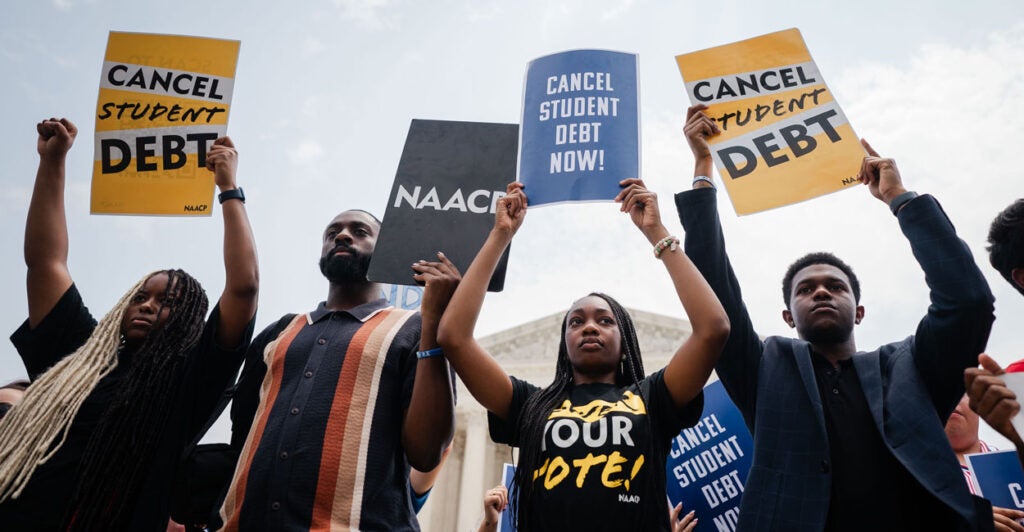After a pause in student loan repayments during the COVID-19 pandemic, borrowers have started paying again. But if history is any guide, some student loan borrowers will pay next to nothing—and after 10, 20, or 25 years, taxpayers, not borrowers, will be forced to pay the outstanding balances.
Now, some members of Congress are trying to extend this freeloading loan scheme to even more students.
A new federal report on student loans found that the share of borrowers who choose income-driven repayment plans increased between 2009 and 2019. Under these plans, borrowers’ monthly repayment amounts vary according to their income. Meanwhile, interest accrues as students pay little or nothing on the principal.
The interest accrual would be bad news for borrowers, except that under the current rules for these repayment plans, taxpayers—not borrowers or students—pay off the balances after 20 or 25 years. This gives borrowers a significant incentive to pay as little as possible and wait for two decades.
While courts have repeatedly blocked President Joe Biden’s administration’s unconstitutional attempts to off-load college loans on to taxpayers, the income-driven repayment plan system has this taxpayer burden built in to its rules already. The administration has tried to lower cancellation to just 10 years under its SAVE proposal, but the 8th U.S. Circuit Court of Appeals granted a nationwide injunction halting the effort.
Now, lawmakers who support Biden’s attempts to move outstanding student loans to taxpayers want to amend another federal loan program, called Parent PLUS loans, to operate like income-driven repayment plans.
Currently, under Parent PLUS, parents take out federal loans to cover tuition payments for their undergraduate students. Parents can borrow up to the cost of attendance but pay higher interest rates on the loans. The repayment schedules can result in some parents repaying student loans well into retirement. Nearly 4 million Americans had Parent PLUS loans in 2023 totaling more than $100 billion.
Under the proposed plan from Sen. Chris Van Hollen, D-Md., and Rep. Alma Adams, D-N.C., taxpayers would pay any remaining balances on Parent PLUS loans after 20 or 25 years, the same thing that happens with income-driven repayment plans now.
The sponsors of the new proposal are ignoring U.S. Supreme Court precedent. The high court has appropriately blocked several attempts by Biden to shift hundreds of billions of dollars in outstanding college student loan debt to working Americans. Most recently, the court declined to lift an earlier appeals court order pausing Biden’s SAVE plan. The SAVE plan would reduce the monthly payments for some loans and, again, includes provisions that would increase the likelihood taxpayers would be forced to pay outstanding student debt.
When the Biden administration introduced SAVE, some observers, such as leaders of the NAACP, complained that Parent PLUS borrowers were not eligible under the proposal.
Van Hollen, Adams, and the other sponsors of the proposal that would require taxpayers to pay outstanding Parent PLUS loans after 20 or 25 years were listening. Their proposal ignores the various court rulings against Biden’s plans to shift costs to taxpayers while catering to interest groups.
It’s important to keep in mind how big the expense of administration’s student loan schemes has been so far. The American Enterprise Institute’s tracker of the administration’s loan write-offs is currently over $406 billion. That’s a cost of around $3,100 for every household in the country. The benefit has mostly gone to high earners who don’t need handouts.
With the gross federal debt now an inconceivable $35.3 trillion, the last thing politicians should do is pretend they’re in a position to ask taxpayers to take on more debt—especially when two-thirds of those taxpayers don’t hold bachelor’s degrees themselves and 80% of Americans don’t have any student loan debt.
It’s bad for the budget, encourages high inflation for college tuition, and is unfair to hardworking Americans who got through life without degrees in puppet arts or gender studies.
Rather than looking for new ways to put taxpayers on the hook for other people’s advanced degrees, Congress should try the opposite approach and get Washington out of the business of subsidizing academia.
